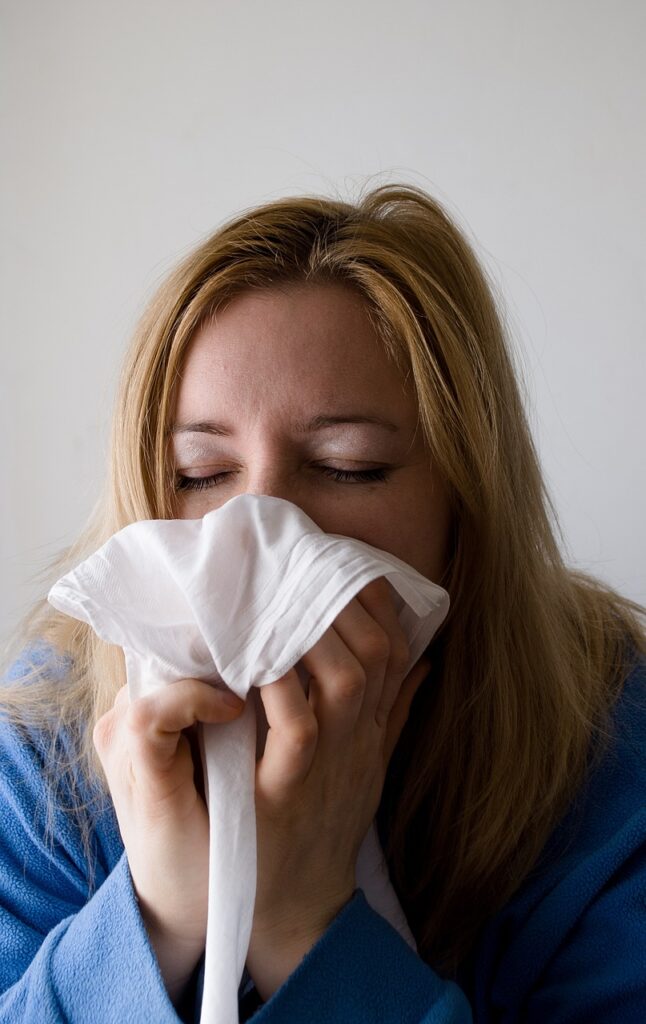What is an Allergy?
An allergy is an abnormal response that the body has to something foreign that it comes in contact with.Although it does not cause damage to the body, the substance stimulates the immune system and induces a reaction. This reaction may trigger a number of symptoms that may cause the person involved some discomfort. Through releasing hormones to cope with what is happening, the body responds to the invading substance and attempts to protect itself.
Just because someone has an adverse response to a substance that they are not used to, does not mean that the person is allergic to the substance and will have to deal with the same symptoms every time they come in contact with it. For example, many medications have potential side effects. If a person suffers from a side effect from the medication they are taking this does not automatically mean that they are allergic to it. In turn, an allergy is something that a person can grow out of or something that they may suffer from once or twice and never again.
Allergy Symptoms.
Common Allergy Symptoms to Watch For.
Allergy symptoms can vary depending on the severity of them. Allergic reactions can fall into the mild, moderate or severe categories and the symptoms get worse as you graduate from one type to the other.

If you suffer a mild allergic reaction the symptoms can include swelling of the skin and a rash, itchy, watery eyes and congestion. A mild allergic attack will not spread to any other spot of the body beyond where it shows itself.
The most powerful remedies growing in your state
Moderate allergic reactions can include some of the above symptoms as well as more intense itchiness and a problem with breathing. If you suffer these types of allergic symptoms and it is diagnosed as a moderate allergic reaction, be aware that it can spread to other spots of your body if not kept in check. Medical attention should be sought for a moderate allergic reaction.
Allergy symptoms that can be classified as severe are known as anaphylaxis. This condition is rare but life threatening. When a severe allergic reaction occurs, the response of the body to an allergen is completely unexpected, intense and can affect not just one part of the body but the entire body. The symptoms can begin with itchiness of the eyes and face and can quickly spread to even more symptoms that become severe very fast.
Some examples of allergy symptoms related to anaphylaxis include pain in the abdomen, varying extents of swelling which can immediately cause problems with the person’s ability to breathe and swallow, cramps, vomiting, diarrhea, dizziness and mental confusion. A severe allergic reaction constitutes a medical emergency and help should be sought without delay.
Most people who suffer from allergies are aware of the potential of the symptoms. It is worth noting however that new allergy can start all of a sudden without any prior warning and therefore keeping watch for potential allergy symptoms is always important.
Allergy Season.
How to Cope with Allergy Season.
Many people think of allergy season as the spring and fall seasons and find that they don’t suffer as much during the summer months. As well, most people are shivering from the cold in the wintertime while allergy sufferers are breathing a sigh of relief. Unfortunately, many people suffer from summertime allergies or what translates to summer congestion and respiratory problems.
There are different triggers for allergies depending on the season of the year. The spring season causes allergies and hay fever that are connected to the pollen of budding trees such as ash, birch, oak, poplar, sycamore, and walnut. The latter part of spring ushers in the pollen of a variety of grasses such as Bermuda, timothy, red top, sweet vernal, bluegrass, and a variety of others.

Allergy season goes into a different phase as summer gets closer. In this case, the air becomes drier and the pollens are gone from the air but a higher level of humidity causes mould fungi to grow on such things as leaves, straw, dead grass and other plants that thrive in damper kinds of weather. By the time the month of July is coming to an end, the mould count is very high and many people find themselves suffering from allergic problems.
If you suffer from summertime allergies there are ways you can help yourself besides just taking your allergy medication. If you plan to spend more than 30 minutes at a time outdoors then make sure that you wear a pollen mask. On days when the pollen count is high to keep all of your windows and doors closed and turn the air conditioner on, making sure it is set to recirculate. Speaking of air conditioners, make sure you either clean or change the AC at least once every month and do not leave your room air conditioners on when you are not at home. These are all self-help ways of coping with the annoyance and discomfort of allergy season.
Allergy Testing.
A Brief Look at Allergy Testing.

If you suffer from an allergy that bothers you frequently and/or the cause of it is unknown, your doctor may decide to send you for the test. First, he will perform a physical exam himself and if he still is not satisfied that he understands the root of the problem he might book an appointment for you to visit an allergist, who is a doctor who specializes in both asthma and allergies.
The first part of allergy testing involves the doctor understanding what symptoms you suffer from and evaluating these symptoms accordingly. The doctor will ask you a series of questions which will help him rule out similar health conditions and also to more closely pinpoint which type of allergy you might be suffering from.
Examples of questions you might be asked include:
-What kind of symptoms do you experience?
-How long have you had these symptoms?
-When the symptoms arise, how often do they stay around?
-Are your symptoms related to the season of the year?
-Do you smoke?
-Do you have pets in your home?
-Are your symptoms worse when you are indoors or outdoors?
The doctor will also give you a complete physical exam and in particular will focus on your skin, eyes, ears, nose and throat. The doctor will look carefully for any swelling, redness, drainage or other allergy symptoms.
If your doctor is still unclear after this part of the testing, he may send you for a blood test or skin test. There are also other types of allergy tests such as food allergy tests. If it is determined that you have an allergy to food then you may be required by your doctor to keep a food diary and markdown everything you eat and drink on a daily basis. You may also be asked to limit or completely remove specific foods from your diet to more accurately determine what the allergy you are suffering from is.
Allergy Medication.
Types of Allergy Medication on the Market.
Many people who suffer from allergies need some form of allergy medication to bring relief from their symptoms. Allergies can cause the skin to itch and swell, the nose to run and feel stuffed up, and eyes to be itchy, watery and very irritated. There is no known cure for allergies but there are a variety of types of medications available, both prescription and over-the-counter.
>>The Natural Anesthetic That Grows in Your Yard <<
Allergy medication can take the form of antihistamines, decongestants, combination medicines, shots, and corticosteroids. Antihistamines have been around for many years and come in the form of liquid, nasal spray, eye drops or pills. Nasal sprays can be used during hay fever season or for bothersome allergies all year long. Some examples of prescription antihistamines include Allegra, Clarinex and Zyrtec. Some examples of over-the-counter medications of this kind include Benadryl, Claritin and Tavist.
Decongestants are especially useful allergy medication for getting rid of congestion and can be used in conjunction with antihistamines for optimum relief from symptoms. They can be purchased as eye drops or nasal spray and in pill or liquid form. Prescription decongestants include Claritin-D and Allegra-D while over-the-counter kinds include Sudafed liquid or tablets, Visine eye drops and Neo-Synephrine.

Combination medicines are two-in-one medications that contain both elements of an antihistamine as well as a decongestant. Together they work to rid the body of a number of different symptoms that occur all at once. There are also combination medicines that bring together asthma and allergy meds, as well as those that combine antihistamine eye drops with a mast cell stabilizer. Prescription forms include Naphcon, Zaditor, Vasocon and Semprex-D, while the over-the-counter kinds include Tylenol Allergy and Sinus, and Benadryl and Sinus.
Steroid medications, known as corticosteroids work to decrease inflammation as well as prevent and treat the sneezing, itchiness, and congestion related to nasal problems that allergies cause. Corticosteroids are also beneficial for swelling and inflammation that is related to other causes besides allergies.
Steroids are a form of allergy medication that is available in pill form, as a nasal spray, as a cream or as eye drops. Examples of nasal steroids include Flonase and Nasonex; examples of eye drops include Alrex and Dexamethasone while an example of an oral steroid is Deltasone (or prednisone). Inhaled steroids are only available with a doctor’s prescription. Some examples of these include Azmacort, Beclovent, Flovent and Pulmicort. Advair is another form that is a combination of a steroid and another type of drug to help relieve asthma symptoms.
Allergy Shots.
Are Allergy Shots Right for Me?
Allergy shots are not good for everyone but tend to work best on people who suffer from severe symptoms, or people who have allergies that over the years have not shown any sign of improvement. If you have experienced a variety of side effects from other forms of medication then allergy shots may be a good idea for you as well.

The allergies that allergy shots work best for including seasonal allergies, indoor allergens and insect stings. Individuals with seasonal allergies or seasonal asthma or hay fever are allergic to such things as pollen from grass, weeds and trees. If you suffer from allergies all year long then you probably are sensitive to any number of indoor allergens which could include such things as cockroaches, pet dander, mould and/or dust mites. Another type of allergies is an allergy to insect stings. Many people experience allergic reactions when they are stung by a bee, wasp, yellow jacket or hornet.
Do this hack to drop 2lb of fat in 8 hours (video tutorial)
Allergy shots may be beneficial to you if you have no way to avoid the triggers for your allergic reaction. For example, if you are allergic to your pet’s fur but refuse to find the animal a new home. They may also be beneficial to you if the medications you have tried in the past, or are using presently are not enough to help relieve you of the symptoms.
If you wish to decrease your use of allergy medication on a long term basis then shots are a viable option. If you are allergic to insect or bee stings then allergy shots are wise as these types of stings can be extremely serious, and in some cases, deadly.
Allergy shots may not be the best course of action if you have recently found out that you are pregnant. However, if you have been getting allergy shots and then find out you are pregnant, this should be fine. If you suffer from severe and uncontrollable asthma or lung or heart conditions (such as taking beta-blockers) then you should not get allergy shots. Allergy shots are not effective for individuals who suffer from any type of food allergies or chronic hives (urticaria).
Allergy Relief.
Long-Term Relief with Allergy Shots.
If you suffer from recurring allergic problems that do not respond well to a variety of types of medication then the type of allergy relief you should consider is allergy shots. This is also the case if you suffer from the side effects of allergy medication. Allergy shots are particularly helpful for kids because they can avoid asthma attacks and they can also reduce the risk of asthma being acquired by a child with hay fever.
It is important to note that long-term relief involves monthly allergy shots and it may take three to five years of consistent injections to achieve the necessary results. The positive news is that either the allergy goes away after the injections end, or else the relief from symptoms continues for several years to come.
Allergy shots are a type of immunotherapy. Each individual shot is made up of substances that trigger allergic reactions in order to boost the effectiveness of the immune system. The shots contain the right amount of substances to do what they need to do but not to cause an allergy attack.
As time passes, the doctor will increase the dosage of the shots in order to allow the body to become accustomed to (or desensitized to) the allergy-causing substances. This will ensure that your immune system will build up a tolerance and will encourage the allergy symptoms to disappear.
Allergy shots are given on a two-stage form of schedule: the build-up stage and the maintenance period. The build-up process typically takes three to seven months and includes having a shot on a weekly basis, one to three times. During this process, the dose is increased to develop immunity to it. This sets the basis for the allergy’s future and for long-term allergy relief.
The maintenance phase is the longest phase and can take anywhere from three years to five years. Once the doctor realises that you have reached your highest level of the shot, that level must be maintained. You will need to have a shot every month and it will contain a consistent amount of the allergy-causing substance. This can all make for allergy relief that lasts.
Allergy Treatment.
Kinds of Allergy Treatment.
In order for a sufferer to know what treatment is best for them, they should go to see an allergist or an ear, nose and throat (ENT) specialist. Once the allergy has been diagnosed, a proper form of treatment will be determined.
Many allergists consider environmental factors in relation to allergies and make sure that their patients receive proper counselling in regards to the ways they can avoid the substances that can elicit allergic reactions. Taking preventative measures can decrease how often the people suffer from an allergy attack, as well as the severity of the attacks.

There are a variety of types of medications on the market, some prescription and other over-the-counter that can help in terms of allergy treatment. Antihistamines and decongestants are very popular as are anti-inflammatory agents. Examples of these include corticosteroids, cromolyn and nedocromil. These medications help to decrease the amount of inflammation in the airways. There is also a type of low-dose corticosteroid nasal spray that is readily used by allergy sufferers and is very effective at managing inflammation in the nose.
Another type of treatment is allergy shots. Allergy shots are recommended for people who suffer from moderate to severe allergies reactions and are also particularly beneficial for children. Doctors also recommended shot for those individuals who find it impossible to stay away from the source of their allergies, such as an allergen found at the workplace or a person who refuses to give up their beloved cat or dog.
Allergy shots as treatment are given in two phases- the build-up phase and the maintenance phase. Patients are given one shot a week and the dosage is increased over time as the person builds immunity to it. Also known as immunotherapy, this type of allergy treatment has been around for many years but the results are not the same for everyone. In most cases, the patient must be given shots for a period of time that can range anywhere from three to five years.
Allergy Research.
The Latest in Allergy Research.
New allergy research is being done all of the time to find ways to combat and control allergy symptoms, especially for those who suffer from the severity of one or more allergies. Even people who have mild forms of allergies find that they can interrupt their life and make it difficult to perform their normal everyday activities.
==> Prickly Flower Eliminates Food Cravings & Burns Away Fat
The Allergy Research Group, found on the web at www. allergy research group.com, put out a newsletter called Focus that relates the variety of types of research stratified that is going on to help sufferers find relief. For example, in 2006 there was a landmark study that came out of Mt. Sinai School of Medicine in New York showed that a series of Chinese herbs (called ASHMI) when blended together, could be almost as effective in helping allergy sufferers as could the use of steroids.
ASHMI has now formed the basis of another allergy research study at Mt. Sinai to see if allergy sufferers who have been dependent on steroid medications for asthma can be weaned off of them and put on the Chinese herbs, with better results, and less concern about side effects. So far, initial results are promising.
The allergy research so far has concluded that these adaptogenic herbs may help to support the hypothalamus-pituitary-adrenal axis and may be beneficial in restoring adrenal function to a normal level. It is also believed that these Chinese herbs may have immunotherapeutic properties that are beneficial to asthma and allergy sufferers.
It is important that researchers and scientists constantly look for new forms of relieving allergy symptoms through allergy research in the hope that eventually a cure for allergies may be found. It is important to keep in mind however that there are many types of allergies and what may help combat one from May may not work well on another form. In other words, what responds well to a drug allergy may not respond as well to a food allergy.
Allergy Report.
A Look at an Allergy Report.
An allergy report can often be found on web stations and websites related to weather. Many news reports often give reports on allergies related to the temperature and season of the year. For example, CNN (www.cnn.com) has on its website an allergy report, as well as a UV Report for people concerned about pollen in the air as well as harmful UV rays.

An allergy report is a good thing to check out before you head out for a day outing, especially during the spring and summer months. If you are planning a camping trip to a spot that you are unfamiliar with, knowing not just what the weather has in store, but also what it has in store for your allergies is a good idea.
The American Academy of Allergy Asthma & Immunology found on the web at http://www.aaaai.org is an excellent resource for finding all of the latest news about allergies, including up to date reports. As well, your local weather station in your community should provide the report about allergy during weather forecasts, as well as have it clearly visible on the website. In many cases, you can also phone up the station to find out the information you need. For many individuals, this information is not only good to have but necessary as allergies can run the gamut from seasonal to occasional to very severe.
Once you know what the allergy report is for the day, and also forecasted for days to come later in the week, you will know on which days you should stay inside and on which days it is okay for you to go outside and participate in outdoor activities. You will also know when to make a trip to the grocery store or pharmacy to pick up more medication so you will be prepared. Preparation is key when you have allergies.
Click through the following topics by the same author to read more ……
MASSAGE THERAPY: TYPES AND HEALTH BENEFITS.
ANXIETY ATTACKS: MEANING, SYMPTOMS, TYPES, MANAGEMENT AND TREATMENT.
